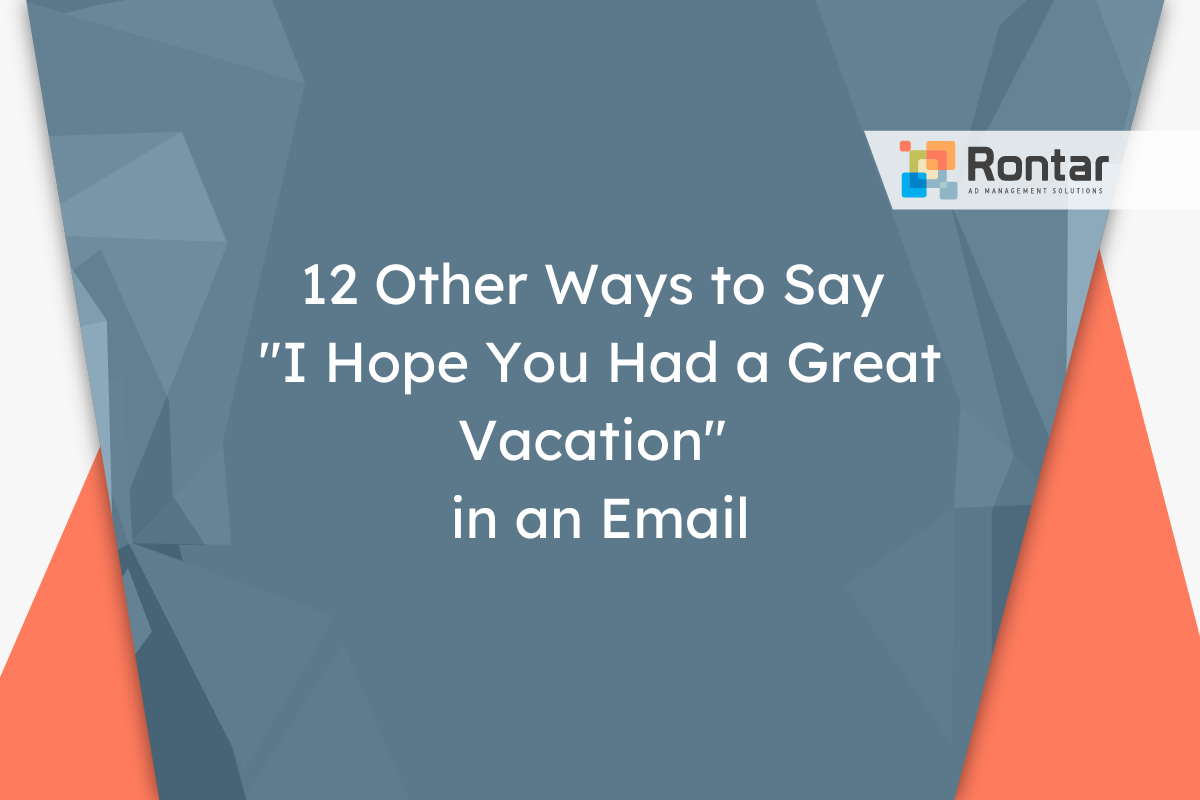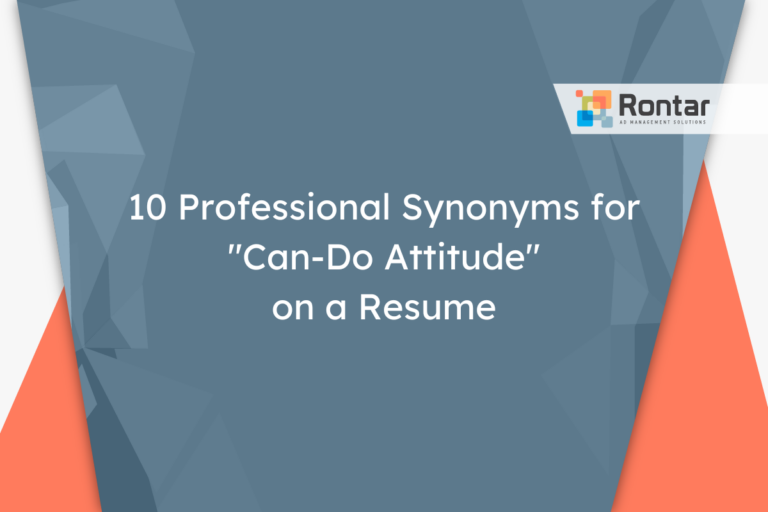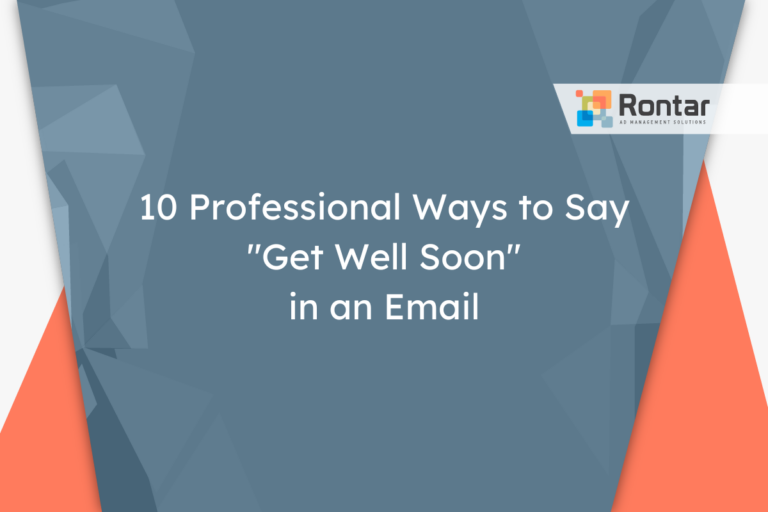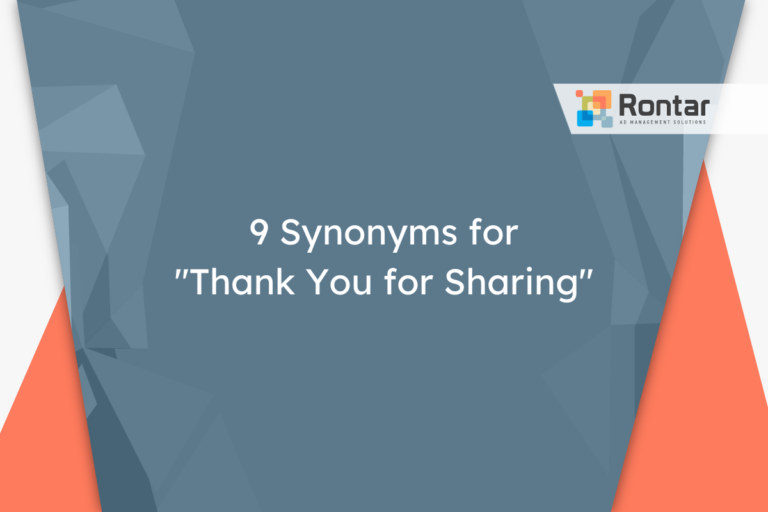12 Other Ways to Say “I Hope You Had a Great Vacation” in an Email

When someone returns from vacation, it’s nice to let them know you hope they had a good time. However, using the same old phrase “I hope you had a great vacation” can feel a bit tired.
This article provides 12 fresh ways to convey your message in an email, making it more interesting and personal. Each alternative is explained to help you choose the right one based on your relationship with the recipient and the workplace environment.
Is It Professional to Say “I Hope You Had a Great Vacation”?
Using the phrase “I hope you had a great vacation” is considered professional, formal or informal depending on the context, but it is always seen as polite. This phrase can add a personal touch to your messages and show that you care about the recipient’s well-being outside of work responsibilities.
It’s suitable in most work-related emails when you’re reaching out to colleagues, clients, or even superiors, as long as you have a generally positive or neutral relationship with them.
Email example:
Hello Alex,
I hope you had a great vacation and are ready to dive back into work with renewed energy.
Looking forward to catching up this week on the project updates.
Best regards,
Emily
Pros:
- Shows empathy and personal interest.
- Helps to strengthen your relationship with the email recipient.
- Sets a positive tone for the remainder of the email.
Cons:
- May be considered too informal for highly traditional or formal workplaces.
- Could be seen as intrusive or too personal in certain professional contexts.
Although “I hope you had a great vacation” is widely accepted, someone might look for synonyms or alternative phrases to either adjust the formality level of their message or simply for variety.
12 Other Ways to Say “I Hope You Had a Great Vacation” in an Email
Let’s explore some alternative phrases that you can use to express your well wishes after someone’s vacation in a professional email setting.
- I hope you enjoyed your time off
- I hope your vacation was refreshing
- I hope you had a fantastic time off
- I hope you enjoyed your well-deserved break
- I hope you’re feeling refreshed after your time off
- I trust you had a wonderful vacation
- I trust you had a relaxing break
- I trust you had a restful vacation
- I hope you’re coming back recharged
- I hope your vacation was everything you needed
- Trusting you enjoyed your time away from the office
- Wishing you had a wonderful time off
1. I hope you enjoyed your time off
This alternative to “I hope you had a great vacation” feels a bit more informal and casual. It implies a genuine interest in the person’s well-being during their absence. It’s a synonym that works well in emails to colleagues you know personally or have a friendly relationship with. This phrase conveys warmth and personal interest.
We recommend this alternative for messages where the aim is to make the recipient feel comfortable and appreciated. It’s perfect for use after shorter breaks or weekends, and fits well in emails to peers or team members in less formal office environments.
Example:
Dear Lisa,
I hope you enjoyed your time off and got the chance to relax.
Looking forward to hearing all about it!
Best wishes,
Tom
2. I hope your vacation was refreshing
This alternative adds an element of care, focusing on the rejuvenating effect a vacation can have on a person. It’s slightly more formal than the original phrase and could be a synonym that’s perfectly suited for professional emails where you wish to maintain a level of formality but still express personal interest.
We recommend using this phrase in emails to colleagues or clients after they’ve returned from a potentially longer break. It’s suitable for environments where maintaining a professional but caring relationship is essential.
Example:
Hello Mark,
I hope your vacation was refreshing and that you are feeling well-rested.
Best regards,
Jenna
3. I hope you had a fantastic time off
This alternative infuses more enthusiasm into the message. The use of “fantastic” suggests that you’re hoping they had an especially enjoyable or memorable break. This phrase leans a tad towards the informal side and conveys a high level of friendliness.
Suitable for messages to colleagues with whom you share a close relationship, this phrase works well when the atmosphere in your workplace is open and friendly. It can add a lively touch to your emails and is great for conversation starters.
Example:
Hi Jeremy,
I hope you had a fantastic time off and are full of stories to share.
Cheers,
Sophia
4. I hope you enjoyed your well-deserved break
This choice phrase emphasizes that the break was earned, showing respect and acknowledgment for the hard work the recipient has put in. It’s a touch more formal and significantly more considerate, making it a great alternative for both supervisors and colleagues alike. It implies that their vacation was not only enjoyable but also necessary and deserved.
This phrase is particularly suitable for emails directed at someone who has been working hard or under a lot of stress. It’s an excellent way to start an email on a positive and understanding note, perfect for creating a sense of camaraderie and appreciation within the workplace.
Example:
Dear Melissa,
I hope you enjoyed your well-deserved break and are feeling rejuvenated.
Warm regards,
Derek
5. I hope you’re feeling refreshed after your time off
This alternative focuses on the outcome of the vacation—feeling refreshed. It’s a lovely, polite way to show you care about the person’s well-being. The focus on ‘feeling refreshed’ adds a personal touch that is caring without being overly informal.
It’s an excellent choice for both colleagues and clients, especially when you are aware they took the time off to recharge. This phrase sets a supportive tone for the rest of your message, making it great for emails that will transition into discussing upcoming work or projects.
Example:
Hello Jordan,
I hope you're feeling refreshed after your time off and ready to tackle our next challenge.
Best,
Andrea
6. I trust you had a wonderful vacation
Here, “I trust” adds a layer of confidence and formality to the message, making it suitable for communications with both clients and higher-ups where you might want to maintain a professional tone while still being warm. It suggests a level of courteous professionalism and is a nice touch when you don’t know the person very personally but want to acknowledge their time away.
This phrase is best used in more formal contexts or when addressing someone you respect and wish to convey goodwill towards, without presuming too much about their personal experiences.
Example:
Dear Robert,
I trust you had a wonderful vacation and are well-rested for our upcoming projects.
Sincerely,
Natalie
7. I trust you had a relaxing break
This version leans a bit more on the personal side, suggesting not just any vacation but specifically a relaxing one. The use of “I trust” still keeps it on the formal side, making it a good balance between personal interest and professional respect. It’s a fantastic choice for when you know the recipient was looking forward to some downtime.
This phrase is great for professional emails where you have a somewhat cordial relationship with the recipient. It implies hope that their break provided them with the relaxation needed to return to work rejuvenated.
Example:
Dear Clara,
I trust you had a relaxing break and feel recharged for the busy season ahead.
Kind regards,
Elliott
8. I trust you had a restful vacation
By focusing on the restfulness of the vacation, this option spotlights the recipient’s need for rest and recovery. Like the previous examples using “I trust,” it positions your message as hopeful yet respects boundaries, making it formal and polite.
Ideal for sending to colleagues or supervisors after a notably hectic period at work, it’s a kind way to say you hope they got the break they deserved. It suits the tone of emails that aim to smoothly transition back into work topics.
Example:
Dear Simon,
I trust you had a restful vacation and are coming back with renewed energy.
Regards,
Jasmine
9. I hope you’re coming back recharged
This phrase puts a positive spin on the return to work, suggesting that the vacation was not just enjoyable but also re-energizing. It’s an upbeat and informal way to welcome someone back, focusing on the positive effects of their time off. This makes it a great choice for a friendly workplace environment where people are encouraged to take breaks for their well-being.
It’s especially fitting for emails to team members or close colleagues who have been away on a break. This phrase subtly shifts the focus towards looking forward to collaborating again, making it perfect for setting an enthusiastic tone for their return.
Example:
Hey Chris,
I hope you're coming back recharged and ready for our next adventure together!
Best,
Alex
10. I hope your vacation was everything you needed
This alternative has a gentle, caring note to it, suggesting a personal interest in whether the vacation fulfilled the recipient’s needs. It’s polite and thoughtful, making it suitable for both professional and somewhat informal situations. The phrase assumes a little familiarity, making it best used with colleagues you have a friendly relationship with.
Great for when someone has been particularly stressed or looking forward to their vacation, it’s a lovely way to acknowledge that you understand their need for a break. This phrase fits well in emails that aim to reconnect and express care for the recipient’s well-being.
Example:
Dear Paula,
I hope your vacation was everything you needed to unwind and relax.
Take care,
Megan
11. Trusting you enjoyed your time away from the office
This phrase suggests a more formal tone with its structure, while still conveying a sense of caring and personal interest. The use of “trusting” implies confidence in the positive outcome of their vacation. It’s suitable for workplace emails where you want to maintain a professional demeanor but also make a warm gesture.
This alternative is appropriate for communication with new colleagues, clients, or in environments where formality is valued. It seamlessly combines hope for their enjoyment with a respectful distance, making it perfect for the start of a professional email.
Example:
Dear Franklin,
Trusting you enjoyed your time away from the office and are feeling refreshed.
Regards,
Helen
12. Wishing you had a wonderful time off
This choice expresses a more direct wish for the recipient’s enjoyment during their vacation, making it feel personal and caring. It leans towards the informal side due to the directness of “wishing,” yet retains a polite vibe, making it adaptable to various situations. It’s a great way to convey genuine care and interest in their well-being.
This phrase is particularly effective in emails among team members who share a good rapport or in an office culture that encourages personal connections among colleagues. It’s an excellent start to an email that aims to celebrate their return with positivity.
Example:
Hello Rebecca,
Wishing you had a wonderful time off and you’re coming back full of energy.
See you soon,
Carlos
Final Thoughts
Choosing the right words to welcome someone back from vacation can boost their mood and show them you care. The alternatives provided here range from formal to informal, giving you options to fit any professional relationship. Using these phrases, you can personalize your emails and make them stand out.






